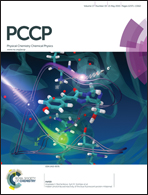DNA damage induced by bare and loaded microporous coordination polymers from their ground and electronic excited states†
Abstract
We report on interactions of cell free double-stranded DNA (dsDNA) with a selected subgroup of Microporous Coordination Polymers (MCPs). In particular, we have studied the influence of different metal ion constituents and chemically modified linkers using a set of five benzene carboxylate-based MCPs. Our results suggest that the DNA moiety can be structurally modified in two different ways: by direct MCPs–dsDNA interaction and/or through photosensitized processes. The extent of the observed damage was found to be strongly dependent on the charge density of the material. The potential use of the MCPs tested as inert carriers of photosensitizers was demonstrated by analyzing the interaction between dsDNA and harmine-loaded Cr-based materials, both in the absence of light and upon UVA irradiation.


 Please wait while we load your content...
Please wait while we load your content...